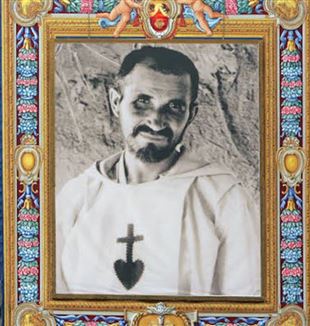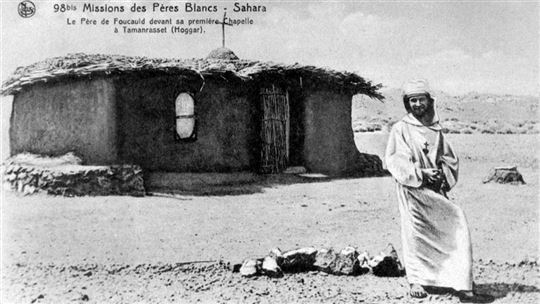
Charles De Foucauld: The “Universal brother”
The date of the canonization of seven new saints has been announced, including the French religious man indicated by the Pope as an example to follow in his last Encyclical. Here is a portrait of the man in the words of those who follow his charism today.The universal Church will soon be able to count upon another seven new saints**. It is a gift for which we should be grateful: these brothers and sisters "encourage us not to stop along the way, encourage us to run with perseverance and impel us to advance constantly towards the goal” (Gaudete et Exsultate, 3). Each of them has lived his or her own path of Christian life, unique as their own existence, but they have all made their lives a gift for love of God and their brothers and sisters, and they show us a concrete, real path so that we too can imitate them.
Included among them is Charles de Foucauld (Strasbourg 1858 - Tamanrasset 1916), the apostle of the desert, beatified in 2005, whom the Pope recalled at the end of his encyclical Fratelli tutti as "'the universal brother'…by identifying with the least did he come at last to be the brother of all" (cf. 286-287).
Who is Charles de Foucauld? He was a man in search, with a non-linear journey of faith, filled by moments of darkness and distance. He came to encounter God after a restless period in which the faith of his childhood seemed lost. At the age of six, he was orphaned and entrusted, together with his younger sister Marie, to the care of his grandfather.
As an adolescent, on his way to a military career, he turned away from faith and sought immediate and ephemeral satisfaction, without being able to satisfy his deep thirst for meaning. A light is rekindled in him when, after leaving the army, he undertook a journey of exploration in Morocco. During this time, he was deeply struck by the hospitality and the perception of God of the Muslim people, and he was fascinated.
Upon his return, he remained restless: he was besieged by questions about God. And he encountered him through the witness of faith of his family members and through the figure of Abbé Huvelin, parish priest of the church of Saint Augustine, a man of faith and a wise spiritual guide, who invited him to place his entire life in the hands of God in confession. From that moment on, everything acquired a different meaning. He himself wrote: "As soon as I knew that there was a God, I understood that I could not do otherwise than to live for Him alone” (Letter to Henry de Castries, August 14, 1901).
During a pilgrimage to the Holy Land, he realized that his vocation was to live imitating Jesus, in the hidden life in Nazareth. He began a journey of searching for God's will that led him to first live in a Trappist monastery for seven years, then in Nazareth, serving the Poor Clares for another three years. He worked humbly and led a life hidden of solitude and prayer. He spent long hours before the Eucharist and listening to the Gospel. After becoming a priest, he felt called to live among the poor of the Algerian Sahara, the most abandoned as they did not yet know Jesus. He wanted to be a brother to them, a universal brother.
He spent the last 15 years of his life in the desert, first in Beni-Abbès, and then in Tamanrasset, among the Touareg. He prayed, worked, welcomed anyone who knocked at his door: soldiers, slaves, the poor, foreigners. He cultivated relationships with many people through intense correspondence. He dedicated himself to the in-depth study of the Touareg language with the intent of providing adequate linguistic tools for future missionaries. He believed in the evangelizing grace of the Eucharist, the discreet presence of Jesus who works in silence, in the midst of those who do not know him. He wished for those who met him to recognize the goodness of Jesus in Him, he sought to imitate. He died on December 1, 1916, killed by a band of marauders.
Charles always wished to have companions, but he died alone, a seed thrown and scattered in the middle of the desert... Yet, after his death, thousands of people, believers and non-believers alike, were attracted by his witness and he became a reference for their lives. Several religious families and ecclesial groups, spread all over the world, follow his path and constitute the great spiritual family Charles de Foucauld.
We, too, the Disciple Sisters of the Gospel, have "met" him. During the course of our personal and community journey in search of God and of evangelical fraternity, we found in his person some insights that are important for us. In particular, the living encounter with Jesus in prayer, listening to the Gospel and contemplating history; openness to others in welcoming and sharing life; daily life as a place in which to live the proclamation of the Gospel, fidelity to small things, the search for goodness. His spirituality is a gift for us and we experience how fruitful it is and how it is capable to speak to the men and women of our time.
Read also - Mexico: Among Lulù's books
In proclaiming him a saint, the Church invites us to look to him. His love for God led him to value all relationships as places of fraternal encounter and care and as occasions for evangelical witness. Starting from this concrete love, he shows us the way to build true, universal fraternity.
* Disciple Sisters of the Gospel
**In addition to Charles de Foucauld, these are the other blesseds who will be canonized: Lazarus, known as Devasahayam; César de Bus; Luigi Maria Palazzolo; Justin Maria Russolillo; Mary Frances of Jesus (Anna Maria Rubatto); Maria Domenica Mantovani